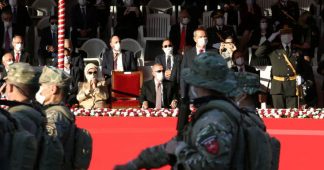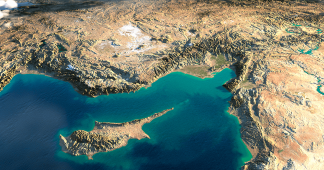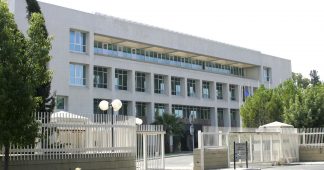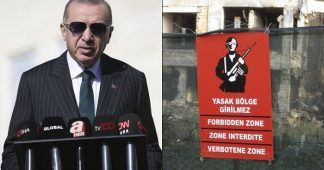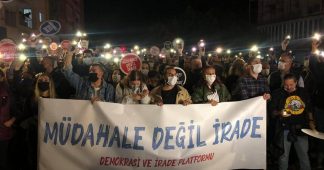By Andreas Theophanous *
Dec. 2, 2020
2020 was not the first time that Turkey’s President Erdogan visited the occupied northern part of Cyprus to celebrate the anniversary of the ‘independence’ of the ‘Turkish Republic of Northern Cyprus’. This time though, it was different: he was accompanied by numerous Turkish ministers and other officials, and also visited the fenced city of Varosha – in violation of the relevant UN resolutions. Erdogan’s new declarations confirm Turkey’s revisionist policies as he called for the opening and the settlement of Varosha, declared the policy of two states in Cyprus, and asked for the “fair sharing of hydrocarbons”. It is important to put these issues in a historical perspective with the objective to critically assess what has been taking place.
On 13 July 1974, Michael Dekleris and Orhan Aldiçasti, two constitutional experts from Greece and Turkey respectively, finalised a draft for a comprehensive settlement based on a unitary state. At the time, however, the national and international media were not focused on the prospect of an imminent solution of the Cyprus problem but on the brewing clash between Cypriot President Makarios and the Greek junta (which was set up with US involvement).
On 15 July 1974, the Greek junta overthrew Makarios and reversed the course of history. The putschist regime in Nicosia announced that “the change was an internal affair of the Greeks of Cyprus only” and that the intercommunal negotiations would be continued in order to find a solution on the agreed basis. Likewise, the Turkish Cypriot leader Rauf Denktash initially stated that what had happened was “an internal affair of the Greek Cypriots.” For Turkey, though, it was a golden opportunity as both the Greek junta and the putschist regime in Nicosia were internationally isolated.
On 20 July 1974, Turkey invaded Cyprus stating that “its peaceful intervention was intended to re-establish the constitutional order and to protect the Turkish Cypriot community.” Three days later, the Greek junta and the putschist regime in Nicosia collapsed.
Despite the cease-fire and the ongoing negotiations for a peaceful resolution, Turkey continued its military operations, launching a second massive attack against Cyprus after the rejection of its ultimatum. Turkish forces eventually occupied 37% of the land of the Republic of Cyprus, having committed atrocities and numerous violations of human rights. Turkey utilised the Turkish Cypriot minority community in Cyprus to advance its expansionist objectives.
Had Turkey stopped its military operations on 23 July 1974 and contributed to the reestablishment of the constitutional order, few would have questioned its stated reasons for ‘intervening’. Instead, Turkey committed ethnic cleansing, set up a puppet regime, and pursued an ambitious policy of colonisation. Furthermore, there was a systematic destruction of the cultural heritage and massive exploitation and usurpation of Greek Cypriot properties.
Despite the initial outcry and resolutions by the UN and other international organisations, no action has been taken against Turkey. Not surprisingly, successive years of bicommunal negotiations under UN auspices have not led to any results. It is also unfortunate that the weaker side, the Greek Cypriots and the Republic of Cyprus, were repeatedly pressured by external mediators to accommodate the Turkish requests. Indicatively, the Annan Plan which was rejected in 2004 by 76% of Greek Cypriots and approved by 65% of Turkish Cypriots and settlers was an extremely uneven and unbalanced plan.
It is also essential to revisit the case of Varosha. We should recall that a 1979 high-level agreement vowed to return the fenced city of Varosha to its Greek Cypriots inhabitants, under the auspices of the UN immediately, after the beginning of a new round of bicommunal negotiations. Since then, and despite multiple rounds of bicommunal negotiations, Varosha has not been returned.
Currently, ‘TRNC’‘President’ Ersin Tatar and Erdogan have embarked on settling Varosha as well. The Turkish declared plans would allow Greek Cypriots to return to their properties and seek compensation, under the ‘rule’ of the ‘TRNC’.
Yet it should not be forgotten that this Turkish protectorate was built on stolen Greek Cypriot land and properties, and the plan now is to extend the occupation to Varosha. These Turkish practices and norms contradict the European value system and international law.
This Turkish move also has additional political implications. Ankara may use this to push for a solution to the Cyprus problem in a way that it will achieve its objective of pushing aside the Republic of Cyprus and replacing it with a confederal arrangement. This will amount to the Finlandisation of Cyprus. Such an arrangement will be detrimental not only for Cyprus but also for the EU and several other countries.
It is useful to compare Ankara’s policy towards the Kurds in Turkey and the Turkish Cypriots. Turkey pursues a policy of double standards. While Ankara appears to be the champion of people of Turkish ethnic background in other countries, at home it violates fundamental political and human rights of its own citizens who are either dissidents or not ethnic Turks.
There is no doubt about Turkey’s intentions on Cyprus. Furthermore, Ankara’s policies are leading to enhanced tensions and also entail the risk of destabilisation in the broader area. While Cyprus cannot afford to give in to the Turkish diktat, other regional and major powers must at last effectively urge Turkey to cease violations of international law.
* President of the Cyprus Center for European and International Affairs, and Head of the Department of Politics and Governance at the University of Nicosia
